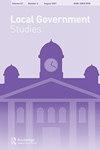城市发展中的组织复杂性悖论:边界管理者对公民提案的处理
IF 1.9
4区 管理学
Q2 POLITICAL SCIENCE
引用次数: 4
摘要
虽然地方政府制定了各种安排来刺激公民参与,但对公民参与后的提案如何处理的了解很少。为了获得影响力,公民倡议必须通过决策过程来处理。本文考察了在挪威奥斯陆的一个基于区域的倡议相关的三个不同案例中,这种处理公民参与输入的动态。研究表明,不同的参与者可以在处理公民建议时扮演边界跨越者的角色,以及这种关键处理如何随着参与性空间与正式决策过程之间的结构和程序联系而变化。这项研究揭示了一个“复杂性悖论”;在不同部门和各级政府共同承担责任的情况下,每个单位都代表一个可以阻碍公民影响的否决点,但也代表一个可以实现这种影响的入口。本文章由计算机程序翻译,如有差异,请以英文原文为准。
The paradox of organizational complexity in urban development: boundary spanners’ handling of citizen proposals
ABSTRACT Although local governments establish various arrangements to stimulate citizen participation, knowledge about what happens with citizens’ proposals after participation is weak. To gain impact, citizen initiatives must be handled through the decision-making process. This article examines the dynamics of such handling of input from citizen participation in three different cases linked to an area-based initiative in Oslo, Norway. The study shows that different actors can play a role as boundary spanners handling citizen proposals, and how this crucial handling varies with the structural and procedural linkages between the participatory spaces and the formal decision-making processes. The study reveals a ‘complexity paradox’; in cases where responsibility is shared among different sectors and levels of government, each unit represents a veto point that can hinder citizen impact, but also an entrance that can enable such impact.
求助全文
通过发布文献求助,成功后即可免费获取论文全文。
去求助
来源期刊

Local Government Studies
Multiple-
CiteScore
4.80
自引率
15.80%
发文量
43
期刊介绍:
Local Government Studies is the leading journal for the study of local politics, policy, public administration and management and governance. First established in 1975, it is an influential forum for critical dialogue and exchange on local government and a vital resource for academics, politicians, policy makers and practitioners internationally. The editors welcome submissions in this field, particularly work of a comparative, methodologically innovative and theoretically challenging nature.
 求助内容:
求助内容: 应助结果提醒方式:
应助结果提醒方式:


